Die Kulturmittler:innen – Der ifa-Podcast zu Außenkulturpolitik
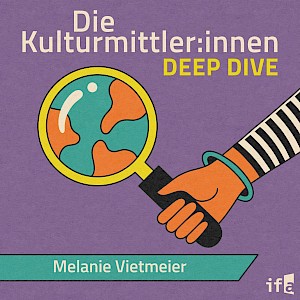
Deep Dive – Biennalen: Globale Plattformen für die Kunst
„Kunst gibt nicht das Sichtbare wieder, sondern Kunst macht sichtbar“ – Paul Klee
Sichtbarkeit in der Kunst ist ein Thema, das in den letzten Jahren an Fahrt aufgenommen hat. Es bilden sich immer mehr globale Plattformen, um Kunst aus aller Welt kuratieren und repräsentieren zu können. Diese Plattformen – sogenannte Biennalen – müssen allerdings auch in einen politischen Rahmen eingebettet werden. Doch welche Förderungen gibt es für internationalen Kunstaustausch? Welcher Kooperationen bedarf es für Biennalen? Und welche Chancen entwickeln sich dadurch? Melanie Vietmeier – Kuratorin am Münchner Lenbachhaus und Autorin der Studie „Biennalen als Seismograph – Geopolitische Faktoren, Förderstrategien und Potenziale internationaler Kollaboration“ – erzählt.
Die ganze Studie „Biennalen als Seismograph“ von Melanie Vietmeier können Sie hier lesen: www.culturalrelations.ifa.de/forschen/ergebnisse/biennalen-als-seismograph/
Weitere Informationen zum Forum Kultur und Außenpolitik finden Sie hier: https://culturalrelations.ifa.de/
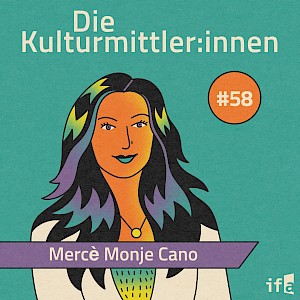
Making unrepresented and indigenous voices heard. With Mercè Monje Cano
Unrecognised states and ethnic minorities are often overlooked, even though people in power repeatedly emphasize the importance of listening to unrepresented groups and indigenous people.
In this episode of “Die Kulturmittler:innen,” our host Amira El Ahl talks to Mercè Monje Cano, Secretary General of the Unrepresented Nations and Peoples Organization (UNPO). She explains how important the voices of indigenous groups are and why unrepresented groups need to be given more attention, especially in the fight against climate change. Her organisation is working on changing this injustice by educating, campaigning and representing unrecognised states such as Tibet, indigenous peoples such as the Mapuche in Chile and minorities such as the Haratin in Mauritania.
Read soon more about the topic of indigeneity in the new issue of KULTURAUSTAUSCH at www.kulturaustausch.de
You can also order this and previous issues of the ifa magazine here.
All episodes of “Die Kulturmittler:innen” and more information can be found on the website of ifa – Institut für Auslandsbeziehungen ifa.de.
Do you have any topic requests, praise or criticism? You are welcome to send them to podcast@ifa.de.
The ifa is also on Instagram @ifa.de and LinkedIn.
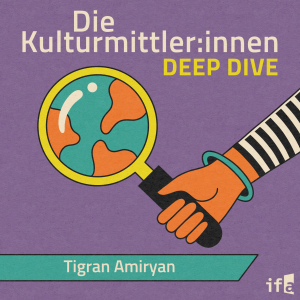
Deep Dive – Tigran Amiryan on Russian Cultural Actors in the Southern Caucasus
In the wake of the Russian invasion in Ukraine, a multi-layered migration pattern has emerged. Armenia and Georgia, nestled in the heart of the South Caucasus, have become havens for Russian and Ukrainian migrants. The influx of these new players in the cultural scene has set off a seismic ripple across the region.
Who are these cultural actors? What stories do they bring with them? How have their artistic foot-prints transformed the local cultural canvas? Tigran Amiryan, founder and president of the Cultural and Social Narratives Laboratory, joins us today. As a semiologist and contemporary culture researcher, he unravels the threads of transformational processes in Armenia and Georgia.
More studies on the topic of ‘Relocation’ can be found under https://culturalrelations.ifa.de/forschen/forschungsergebnisse/.
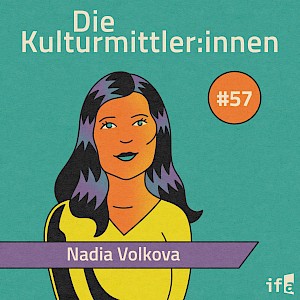
Documenting War Crimes in Ukraine. With Nadia Volkova
Two years ago, Russia invaded Ukraine. At 5 a.m., sirens were wailing across the country and explosions were heard everywhere. Since then, a group of over 30 NGOs has come together to document and collect the war crimes and crimes against humanity committed during this war to bring them to court. In this episode „Die Kulturmittler:innen“ we talked to Nadia Volkova. The lawyer is the director of the Ukrainian Legal Advisory Group and part of the Ukraine 5 AM Coalition. She explained the work of the coalition, the support from the civilian population and Germany’s responsibility towards Ukraine. The Ukraine 5 AM Coalition is honoured with the ifa Award this year. ifa – Institut für Auslandsbeziehungen recognises the contribution of individuals and institutions to foster transcultural relations through their social, socio-political or artistic work.
All previous episodes of „Die Kulturmittler:innen“ and more information about the ifa Award can be found on the website of ifa – Institut für Auslandsbeziehungen ifa.de.
Do you have any topic requests, praise or criticism? You are welcome to send them to podcast@ifa.de.
The ifa is also on Instagram @ifa.de and LinkedIn.
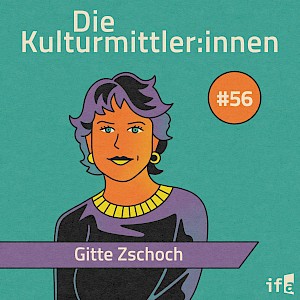
Kulturarbeit: Globale Vernetzung für den Frieden. Mit Gitte Zschoch
Verständnis und Vertrauen – diese Werte prägen den globalen Kulturaustausch und erscheinen in Zeiten von Krisen und Kriegen wichtiger denn je. Gitte Zschoch, Generalsekretärin des ifa – Institut für Auslandsbeziehungen spricht mit Host Amira El Ahl über aktuelle Chancen und Herausforderungen von internationaler Kulturarbeit, wie Gesprächsräume in zunehmend illiberalen Gesellschaften geschaffen werden können und wie “die Welt ein sichererer Ort wird”.
Alle bisherigen Episoden von “Die Kulturmittler:innen” sind auf der Webseite des ifa – Institut für Auslandsbeziehungen zu finden.
Themenwünsche, Lob und Kritik? Diese können gerne an podcast@ifa.de geschickt werden.

Der Nahostkonflikt und die Rolle der Medien. Mit Christopher Resch
In dieser Folge richten wir unseren Blick auf die Situation der Medien und die Pressefreiheit im Nahen Osten. Mit Host Amira El Ahl blickt Christopher Resch, Pressereferent für Reporter ohne Grenzen und ehemaliger freier Journalist auf die Lage in Westasien und Nordafrika, die Presse- und Medienfreiheit in der Region und auf die Rolle, die Medienhäuser und soziale Netzwerke dort einnehmen. Diese Folge wurde Ende November 2023 aufgezeichnet. Hintergrundinformationen und Beiträge aus der Region bietet das Portal www.qantara.de in arabischer, englischer und deutscher Sprache, das vom ifa in Kooperation mit der Deutschen Welle herausgegeben wird.
Alle bisherigen Episoden von “Die Kulturmittler:innen” finden Sie auf der Webseite des ifa, dem Institut für Auslandsbeziehungen.
Sie haben Themenwünsche, Lob und Kritik? Diese können gerne an podcast@ifa.de oder auf Instagram und LinkedIn geschickt werden.
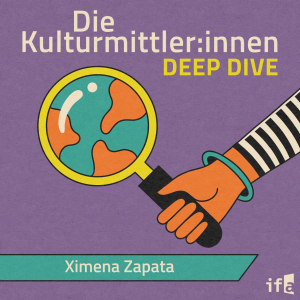
Deep Dive – Ximena Zapata on China’s Cultural Diplomacy in a New Era of Multilateralism
China’s Rise as a global economic powerhouse is one of the most consequential events of our time. This meteoric ascent challenges the existing world order, and in response, China has strategically harnessed its cultural diplomacy to bolster its influence worldwide. In this episode of „Die Kulturmitter:innen – Deep Dive“ we speak with Ximena Zapata, a specialist in China-Latin America relations and international cooperation in Latin America. She just published a study about China’s cultural diplomacy and its way to achieve its ambitious objective of consensual hegemony.
If you want to read the whole study of Ximena Zapata, click here: https://culturalrelations.ifa.de/forschung-detail/chinas-cultural-diplomacy-multilateralism/
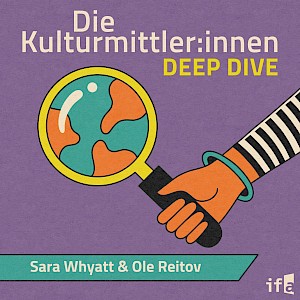
Deep Dive - Sara Whyatt & Ole Reitov on supporting Artistic Freedom
Artists and cultural institutions often cross borders by challenging conventional, religious, social, and political norms. As a result, they are under intense scrutiny, subjects to repression and even attacked by other parts of civil society. What measures are in place to ensure the protection of these artists? And how can international cultural relations contribute to safeguarding artistic freedom? This is the subject of the research project by Sara Whyatt and Ole Reitov, both experts for the UNESCO on this topic and today’s guests in this episode of Die Kulturmitter:innen - Deep Dive.
Their study will be published next year. To explore other recent research studies on artistic freedom and temporary relocation programmes for artists at risk, visit: https://bit.ly/mri-studien
To learn more about the Martin Roth-Initiative and its programmes for artists at risk, click here: https://bit.ly/martin-roth-initiative
If you have any questions or comments, please feel free to email us at podcast@ifa.de.
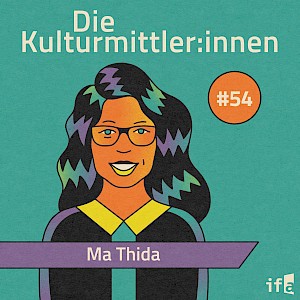
Myanmar: 900 Days of the Spring Revolution. With Ma Thida
Myanmar seemed to be on a well-paved road to democracy, after political reforms had been initiated in 2011 and the first free elections had been held after 25 years in 2015. The military coup in 2021 ended it abruptly. Ever since, a civil war has been simmering, in which thousands have been arrested and killed. Among those arrested was the democratically elected leader of the country, Aung San Suu Kyi. She started out as one of the revolutionary icons in the democratic protests in 1988, known as the 8888 protests. In 1991, she was awarded the Nobel Peace Prize, but was later on heavily criticized for her stance on the Rohingya genocide in 2017.
Our guest, Ma Thida – surgeon, author, and human rights activist – joined the prodemocratic movement behind Suu Kyi. In 1993, she was arrested and sentenced to 20 years in prison for her political engagement and support of Suu Kyis party. After six years, she was released due to her health conditions and international pressure. In this episode of ‘Die Kulturmittler:innen’, Ma Thida talks about the role of icons in revolutions and literature as a tool for freedom and protest while giving us an insight on recent developments in her country.
All previous episodes of ‘Die Kulturmittler:innen’, e.g. on Taiwan as a democratic role model, can be found here: https://www.ifa.de/ifa-podcast/
Do you have topic requests or feedback? Feel free to send them to podcast@ifa.de.
More information on ifa – Institut für Auslandsbeziehungen at https://www.ifa.de.
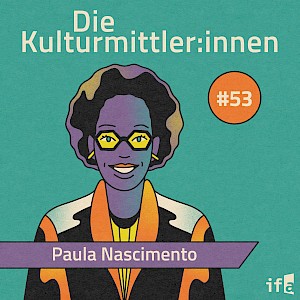
Curating art: transnational, collaborative, and interdisciplinary. With Paula Nascimento
While the art of curating was once led by museums, its role has been transformed over the years. A curator nowadays wears many hats: They are curators, producers, mediators – working across fields and disciplines, across borders and mediums, and across physical and virtual spaces. The freelance curator and architect Paula Nascimento is part of this ever-changing process. Having participated in interdisciplinary and collaborative projects, the Angolan curator has a unique perspective on her profession that she shares with us in this episode.
Nascimento explains the many layers of curating and how she herself has experienced it in collaborative and interdisciplinary projects. In this episode, we also take a look at the role of international exhibitions, such as the Venice Biennial, where Nascimento co-curated the Angolan pavilion in 2013. It was the first and only time, an African country received the golden lion for its national representation. And finally, she gives us an insight into virtual art spaces, with ifa’s digital exhibition “ARE YOU FOR REAL – Phase 1” that she curated together with various artists and curators.
If you want to learn more about the digital exhibition, ARE YOU FOR REAL, click here: https://www.ifa.de/tournee/are-you-for-real/
For more information on the potential of transnational cooperations in curating, you should read our study “What does ‘curating’ mean today?” by the art historian Annette Tietenberg. You can find the full study here: https://culturalrelations.ifa.de/en/research/details/what-does-curating-mean-today/
All previous episodes of “Die Kulturmittler:innen”, e.g. on feminist foreign policy or our special episodes on Ukraine, can be found here: https://www.ifa.de/ifa-podcast/
Do you have topic requests or feedback? Feel free to send them to podcast@ifa.de.
More information on the Institut für Auslandsbeziehungen at https://www.ifa.de.
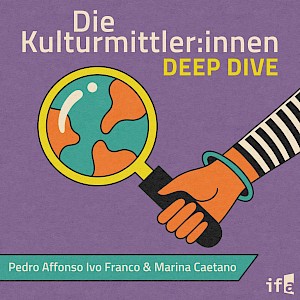
Deep Dive – Decolonial Perspectives in Climate Policy with Marina Caetano and Pedro Affonso Ivo Franco
Colonial legacies continue to shape international cooperation and climate policy. While actors in the climate debates seem to be aware of that, the question remains: what is specifically being done about it? In this episode researchers Marina Caetano and Pedro Affonso Ivo Franco talk about their study “Analysing Decolonial Climate Perspectives: The Case of the Brazilian Legal Amazon Region” and explain their position that a decolonial perspective needs to be central to the global response to climate change.
Read the full study here: Analysing Decolonial Climate Perspectives https://culturalrelations.ifa.de/en/research/details/analysing-decolonial-climate-perspectives/ You will find more research on topics of international cultural relations supported by ifa here: https://culturalrelations.ifa.de/en/research/
For all other information visit our website: https://culturalrelations.ifa.de/en/ To learn more about ifa: https://www.ifa.de/en/
If you have any questions or comments, please feel free to email us at podcast@ifa.de.
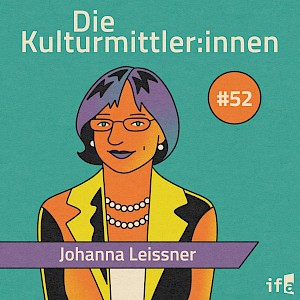
Kulturerbe: Vom Klima bedroht. Mit Johanna Leissner
Dürre, Überflutungen und Flächenbrände. Wir sehen die Auswirkungen der Klimakrise fast täglich in den Nachrichten. Worüber bisher aber kaum berichtet wird: wie diese Katastrophen unser materielles und immaterielles Kulturerbe beschädigen oder sogar gänzlich zerstören. Deshalb sprechen wir in dieser Folge von „Die Kulturmittler:innen“ mit Johanna Leissner. Sie arbeitet für das Fraunhofer-EU-Büro in Brüssel und forscht seit über 20 Jahren zum Erhalt des kulturellen Erbes, wobei ihr Schwerpunkt auf den Auswirkungen des Klimawandels liegt. Im Interview erzählt sie, wie sehr die Klimakrise weltweit Kulturstätten bedroht, inwiefern auch immaterielle Kulturgüter davon betroffen sind, und welche Lösungsansätze und Strategien existieren, um Kulturerbe zu schützen.
Weitere Informationen und Beiträge zum Thema Kultur und Klima finden Sie hier: https://www.ifa.de/kulturbeziehungen-und-klimaschutz
https://www.ifa.de//insel-der-uebriggebliebenen https://www.ifa.de/podcast/klima-krisen-und-kultur-mit-r-andreas-kraemer
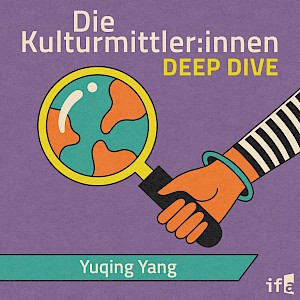
Deep Dive – Yuqing Yang on Taiwan’s External Cultural Policy
Taiwan is still not recognised as a state by the international community. What role does its external cultural policy play for the country? In this episode, we talk to Yuqing Yang about the topic. The historian and research associate at Hertie School in Berlin furthermore gives a brief insight into the “External Cultural Policy Monitor – Taiwan”. In this country report on Taiwan, she presents insightful data and information on Taiwan’s external cultural policy.
Read the full Taiwan Country Report here: https://culturalrelations.ifa.de/en/research/details/taiwan-country-report/
For more information on the External Cultural Policy Monitor, click here: https://culturalrelations.ifa.de/en/research/#c12686
You will find more research on topics of International Cultural Relations supported by ifa here: https://culturalrelations.ifa.de/en/research/
To learn more about ifa: https://www.ifa.de/en/
Do you have topic requests or feedback? Feel free to send them to podcast@ifa.de

Taiwan: Democratic Role Model and Cultural Plurality. With Emily Y. Wu
Taiwan usually appears in Western media because of the simmering conflict with mainland China or its global dominance in the semiconductor industry. The entrepreneur and podcaster Emily Y. Wu lets us in on other issues that are moving the Taiwanese people today beyond these two topics. In this episode, she gives an insight into her work and her country – one of only three “full democracies” in Asia.
Wu explains how metal music and politics fit together, what tensions still remain between the various ethnic groups in Taiwan and how she lives with the constant threat of a Chinese invasion.
Furthermore, the ifa magazine KULTURAUSTAUSCH has dedicated its current issue II/2023 to Taiwan. In doing so, it also sheds light on topics beyond the current news situation and offers other perspectives on the island state in the West Pacific.
For English articles from the current edition of KULTURAUSTAUSCH, you can visit the website at kulturaustausch.de or order the German print issue of the magazine here: https://www.kulturaustausch.de/de/bestellen/bestellung
To listen to Freddy Lim’s personal playlist, click here: https://www.kulturaustausch.de/de/archiv/dossiers/taiwan/playlist
If you want to learn more about Taiwan’s approach on cultural diplomacy, you can download our country report on Taiwan: https://culturalrelations.ifa.de/forschung-detail/taiwan-country-report/
If you would like to find out more about Emily Wu’s work, listen to her podcast „Metalhead Politics“.
All previous episodes of “Die Kulturmittler:innen”, e.g. on feminist foreign policy or our special episodes on Ukraine, can be found here: https://www.ifa.de/ifa-podcast/
Do you have topic requests or feedback? Feel free to send them to podcast@ifa.de.
More information on the Institut für Auslandsbeziehungen at https://www.ifa.de.
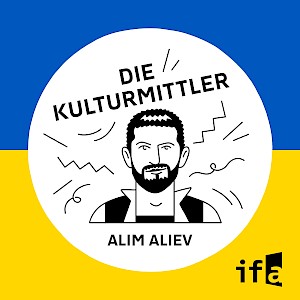
What comes after the War? Mit Alim Aliev
Although Ukraine is one of the largest countries in the centre of Europe, the country has been in the shadow of international attention for over 30 years since the collapse of the Soviet Union. The Russian invasion has changed that. The Ukraine Institute tries to bring Ukrainian culture and history closer to foreign countries.
Our guest today, Alim Aliev, is Deputy Director of the Ukraine Institute. In this episode of die Kulturmittler, he tells us about the strategies Russia is using to try to bind Crimea closer to itself and what this means for the Crimean Tatars. He himself belongs to the Crimean Tatar minority and does research on this ethnic group.
We also learn how the Ukraine Institute works against Russian propaganda and how it tries to preserve and spread Ukrainian culture and history.
You can find all previous Kulturmittler episodes, including the one on Ukraine, at https://www.ifa.de/digitale-formate/podcast/. If you like to learn more about the Ukraine Institute you can visit their website: https://ui.org.ua/en/
Do you have topic requests, praise or criticism? Feel free to send them to podcast@ifa.de.
More information on the Institute für Auslandsbeziehungen at https://www.ifa.de.
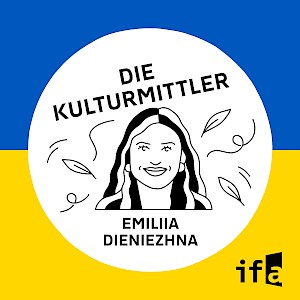
Wie Waschmaschinen Rüstungssanktionen aushebeln. Mit Emiliia Dieniezhna
Derzeit sind über 13.000 Sanktionen gegen Russland in Kraft, einige davon seit der Krimannexion 2014. Die ukrainische Journalistin Emiliia Dieniezhna ist für die Independent Anti-Corruption Commission (NAKO), eine zivilgesellschaftliche NGO, tätig. Dort untersucht sie, wie die Sanktionen der EU, der USA und anderer westlicher Staaten von der russischen Rüstungsindustrie umgangen werden und erläutert im Podcast, was Haushaltsgeräte wie Kühlschränke und Waschmaschinen damit zu tun haben.
Neben den Schwächen der Sanktionspakete gegen Russland, spricht die Ukrainerin in dieser Kulturmittler-Episode auch über die Korruptionsbekämpfung innerhalb der Ukraine und erklärt, weshalb es neben vier Anti-Korruptionsämtern noch eine zivilgesellschaftliche NGO dafür benötigt.
Alle bisherigen Episoden von “Die Kulturmittler” finden Sie hier: https://www.ifa.de/digitale-formate/podcast/
Sie haben Themenwünsche, Lob und Kritik? Diese können gerne an podcast@ifa.de geschickt werden.
Mehr Informationen zu Projekten und Initiativen des ifa rund um die Ukraine finden Sie unter https://www.ifa.de/ukraine-projekte/
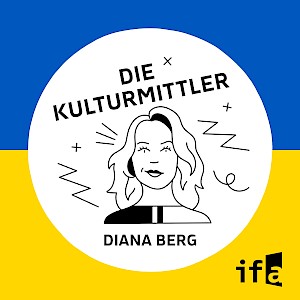
Ukraine War: Channeling Emotions into Art. With Diana Berg
In 2014, the artist and human rights activist Diana Berg fled from Donetsk to Mariupol to escape pro-Russian separatists. Eight years later, she had to leave her home a second time when Russia invaded Ukraine.
In this episode of ‘Die Kulturmittler’, Diana Berg talks about the meaning and potential of art and art spaces in times of war. In 2016, she founded the art platform TU in Mariupol, which she now continues to run in exile. We also learn about her on-going commitment to amplify Ukrainian voices and their needs at international art events, such as the Documenta or the Berlinale.
You can find all previous ‘Die Kulturmittler’ episodes, including the special episodes on Ukraine, at https://www.ifa.de/digitale-formate/podcast/.
Do you have topic requests or feedback you want us to know? Feel free to send them to podcast@ifa.de.
For more information on ifa’s Ukraine projects and initiatives visit: https://www.ifa.de/en/ukraine-projects/
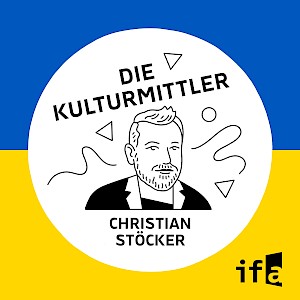
WarTok: Der Ukrainekrieg auf Social Media. Mit Christian Stöcker
Als Russland vor einem Jahr die Ukraine überfiel, war es möglich in Echtzeit das Vorrücken der russischen Truppen, Raketenangriffe oder ukrainische Proteste in den sozialen Medien zu verfolgen. Die New York Times sprach vom „ersten TikTok Krieg“.
In dieser Folge „Die Kulturmittler“ erklärt der Autor und Psychologe Christian Stöcker, inwiefern sich die Kriegsberichterstattung durch die sozialen Medien verändert hat. Jeder Mensch kann mit einem Smartphone unmittelbar Nachrichten in die Welt senden und durch TikTok, Twitter und Co. die klassischen Gatekeeper wie Nachrichtenredaktionen und deren Filter umgehen. Außerdem analysiert Christian Stöcker, die Kommunikationsstrategie des ukrainischen Präsidenten Wolodymyr Selenskyj in den sozialen Netzwerken.
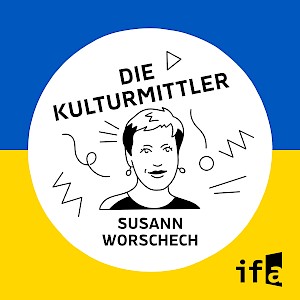
Ukrainische Zivilgesellschaft: Stark, resilient und krisenerprobt. Mit Susann Worschech
Im Angriffskrieg Russlands zeigt sich die ukrainische Zivilgesellschaft resilient, stark und handlungsfähig. Vor einem Jahr sprachen wir bereits mit der Sozialwissenschaftlerin Susann Worschech über die Rolle der ukrainischen Zivilgesellschaft im Krieg und die Tragfähigkeit der internationalen Solidarität. In dieser Folge “Der Kulturmittler” erfahren wir, wie sich die Gesellschaft unter dem Druck des Krieges entwickelt hat. Anders als die russische Regierung vielleicht erwartet hatte, erklärt Worschech, sei die ukrainische Zivilgesellschaft kein passives Objekt der Politik. Stattdessen sei sie geleitet von einer starken kollektiven Idee des Widerstandes und der Solidarität - auch im Exil. Im Interview blickt sie zudem kritisch auf die zögerliche westeuropäische Haltung und plädiert dafür, die Stimmen der Ost- und Mitteleuropäer:innen stärker in das politische Handeln Europas zu integrieren.
Die Kulturmittler Folge #37 mit Volodymyr Yermolenko und Susann Worschech: https://www.ifa.de/37-standwithukraine-bedroht-aber-stark-mit-susann-worschech-und-volodymyr-yermolenko-1/
Sie haben Themenwünsche, Lob und Kritik? Diese können gerne an podcast@ifa.de geschickt werden.
Mehr Informationen zu Projekten und Initiativen des ifa rund um die Ukraine finden Sie unter www.ifa.de/ukraine-projekte/
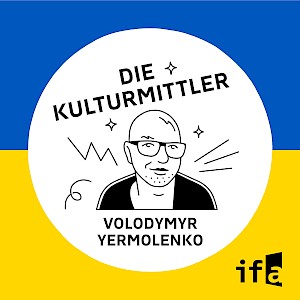
Ukraine’s cultural scene after a year of war. With Volodymyr Yermolenko
Vor einem Jahr hat Russland mit einer groß angelegten Offensive die Ukraine überfallen und damit den seit der Annexion der Krim 2014 schwelenden Konflikt eskalieren lassen. Wenige Woche nach Beginn der Invasion luden wir Volodymyr Yermolenko zu den “Kulturmittlern” ein. Damals sprach der ukrainische Schriftsteller und Philosoph über die ukrainische Gesellschaft und darüber, welche Rolle die Kultur für das Wohlbefinden in Kriegszeiten spielt. Nun, ein Jahr später, ist Volodymyr Yermolenko wieder zu Gast im ifa-Podcast. Gemeinsam blicken wir auf das vergangene Jahr zurück und erfahren wie sich die ukrainische Zivilgesellschaft und Kulturszene unter dem Druck des Krieges entwickelt hat.
A year ago, Russia invaded Ukraine with a large-scale offensive, escalating the conflict that had been simmering since the annexation of the Crimea in 2014. A few weeks after the invasion had begun, we invited Volodymyr Yermolenko to ‘Die Kulturmittler’. At the time, the Ukrainian writer and philosopher spoke about Ukrainian society and the role culture plays in well-being in times of war. Now, one year later, Volodymyr Yermolenko is once again a guest on the ifa podcast. Together, we look at the past year and how Ukrainian civil society and the cultural scene have developed during the war in Ukraine.
Die Kulturmittler Folge #37 mit Volodymyr Yermolenko und Susann Worschech: https://www.ifa.de/37-standwithukraine-bedroht-aber-stark-mit-susann-worschech-und-volodymyr-yermolenko-1/
Sie haben Themenwünsche, Lob und Kritik? Diese können gerne an podcast@ifa.de geschickt werden.
Mehr Informationen zu Projekten und Initiativen des ifa rund um die Ukraine finden Sie unter https://www.ifa.de/ukraine-projekte/
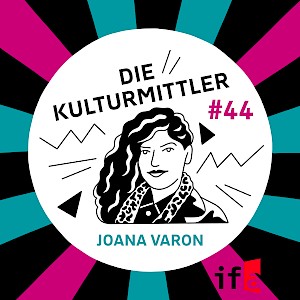
Digital Technology and Human Rights. With Joana Varon
Originally seen as a tool for revolution and access to knowledge for all people, the internet and digital technologies have become monopolized by big tech companies and individual stakeholders. Where once issues of creative commons and changing power structures were discussed, digital space has now been clouded by hate speech, misinformation, and power imbalances. In this episode, we talk to Joana Varon, a technology and human rights fellow at Harvard Kennedy School, about digital rights, the Internet’s potential for empowerment and discriminating artificial intelligence. To protect democracies and minorities online, Varon believes that we need to diversify technology and depart from the idea of universal software solutions.
Transcript of the episode: https://bit.ly/ifaPodcast44Transkript
More input on digital technology: KULTURAUSTAUSCH article ‘Light is the enemy’: http://bit.ly/3WkYuJN.
Interview with Manouchehr Shamsrizi ‘Upgrade to the Metaverse?’: http://bit.ly/3YHwAJo
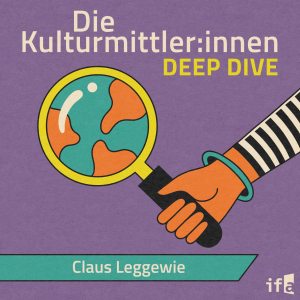
Deep Dive – Claus Leggewie on the FIFA Worldcup in Qatar
In 2016 Claus Leggewie published an article on “Sports, culture, development and foreign policy” in ifa’s magazine “Culture Report Progress Europe” in which he described sports as an amplifier of globalisation. He argued that spectators of major sporting events formed a transnational community, albeit a volatile one. What does Claus Leggewie have to say on this topic in view of the politically heavily charged Soccer World Cup in Qatar?
Find more information on our website: https://culturalrelations.ifa.de/en/

Die Türkei, die EU und Menschenrechte. Mit Selmin Çalışkan
Politisch motivierte Prozesse gegen regimekritische Personen sind in der Türkei nahezu an der Tagesordnung. Begründet werden sie durch die Anti-Terror-Gesetzgebung der Türkei, auch wenn der Europäische Gerichtshof diese Inhaftierungen als rechtswidrig einstuft – wie im prominenten Fall des Kulturförderers und ifa-Preisträgers Osman Kavala. In der aktuellen Folge des ifa-Podcasts berichtet die Menschenrechtsexpertin Selmin Çalışkan über die aktuellen Entwicklungen in der Türkei hinsichtlich Demokratie, Rechtsstaatlichkeit und dem Verhältnis zu Europa. Angesichts der bevorstehenden Parlamentswahlen im kommenden Jahr befürchtet sie eine Verschlechterung der Situation. Zur Unterstützung fordert sie eine aktivere und klare Positionierung Deutschlands und der EU gegenüber der türkischen Regierung.
Das Transkript zur Episode: https://bit.ly/Folge43Transkript Mehr Informationen zum ifa-Preis: https://www.ifa.de/organisation/ifa-preis/
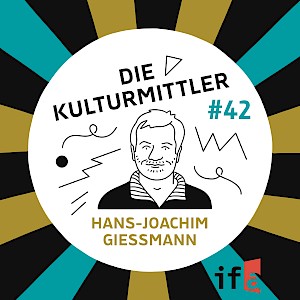
Wie geht Frieden? Mit Hans-Joachim Gießmann
Die globale Verflechtung von Kriegen und Krisen sind mehr denn je zu spüren und können nahezu in Echtzeit verfolgt werden. Nach wie vor wird auf den Einsatz von Militär oder wirtschaftlichen Sanktionen zurückgegriffen. Was das für die Friedens- und Sicherheitspolitik im globalen Kontext und in Deutschland bedeutet erklärt uns Hans-Joachim Gießmann, Politikwissenschaftler und Senior Advisor der Berghof Foundation. Er ruft dazu auf, dass staatliche und zivilgesellschaftliche Akteur:innen noch enger zusammenarbeiten müssen und die Forschung ihren Fokus stärker auf Friedens- statt Kriegsursachen legt.
Das Transkript zur Episode: https://bit.ly/transkript_Folge42
Alle Diskussionen und Keynotes der ICRRA-Konferenz 2002: „Culture in Security“ auf YouTube: https://bit.ly/ICRRA_YouTube_Playlist
Mehr zum internationalen Forschungsnetzwerk ICRRA: https://www.ifa.de/forschung/icrra/
Mehr Informationen zum Berlin Peace Dialogue des Beirats Zivile Krisenprävention und Friedensförderung https://www.ifa.de/konferenz/berlin-peace-dialogue-2022/ https://beirat-zivile-krisenpraevention.org/veranstaltung/berlin-peace-dialogue-2022/

Afghanistan: Of Values, Human Rights and Freedom. With Negina Yari
One year after the Taliban took control over Afghanistan, the life of women and society have changed fundamentally. Civil society activists have either fled the country or shifted their work to humanitarian aid. We talked to Negina Yari, an exiled Afghan human rights defender, about the deteriorating situation in her country. She explains how human rights defenders can still support their people from exile, and to what actions other Islamic states and the international community should really commit.
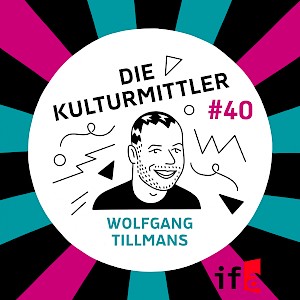
Kunst zwischen Kolonialismus und Kulturaustausch. Mit Wolfgang Tillmans
Der deutsche Künstler und Fotograf Wolfgang Tillmans tourte die letzten fünf Jahre mit der ifa- Ausstellung „Fragile“ durch acht Länder in Afrika – unter anderem Äthiopien, Kamerun und Südafrika. In der aktuellen Folge der „Kulturmittler“ spricht er über Zugänglichkeit und Möglichkeiten, die Kunst als Plattform für Begegnungen bietet, die Bedeutung der kolonialen Vergangenheit Deutschlands und die Rolle von Politik in der Kunst. Transnationaler Kunst- und Kulturaustausch kann einen bedeutenden Beitrag leisten, wenn es darum geht internationale Beziehungen zu stärken und in einen Dialog auf Augenhöhe zu treten.
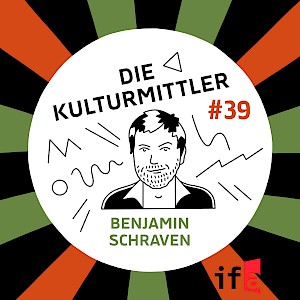
Fluchtziel Europa? Mit Benjamin Schraven
Seit dem Ukraine-Krieg rückt das Thema Flucht und Migration erneut ins kollektive Bewusstsein. Fluchtursachen und Fluchtbewegungen gibt und gab es zu jeder Zeit. Die Gründe dafür sind komplex und beeinflussen sich gegenseitig. Nach dem neuesten Bericht der UNO wurden gegenwärtig mehr als 100 Millionen Menschen gewaltsam aus ihrer Heimat vertrieben. Nicht immer sind es Kriege und Konflikte, die Menschen zur Migration bewegen. Auch Umwelt- und Klimawandel sind treibende Faktoren für das Verlassen der Heimat. Benjamin Schraven, Migrationsforscher und -berater, berichtet in dieser Folge der „Kulturmittler“, wie sich Migration entwickelt hat, von der Komplexität von Fluchtursachen und Zukunftsfragen.
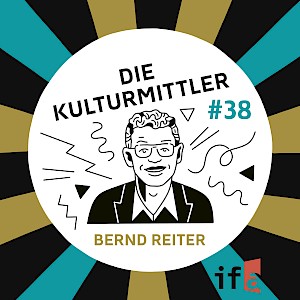
(Dis)functional democracy? Western values and global realites. With Bernd Reiter
About 21 countries are full democracies, about 53 flawed ones and the rest are not considered democratic, states our guest for this episode, political scientist Bernd Reiter. We talk about foreign policy and the need to pursue it in a more honest way - opposed to the self-interest with which Western nations engage in the promotion and strengthening of democratic values in places such as Afghanistan or Latin America. Also, there is quite some discontent when it comes to democracy: Recurrently and around the world, people seem to feel like they live in a democracy and yet have no real control.
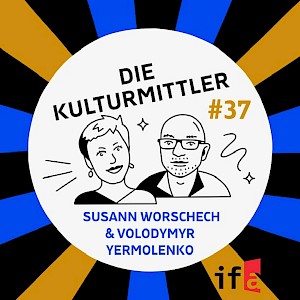
#StandWithUkraine: Bedroht, aber stark. Mit Susann Worschech und Volodymyr Yermolenko
Vor dem Hintergrund des Krieges in der Ukraine sprechen wir in dieser Folge über die starke Rolle der ukrainischen Protest-Zivilgesellschaft – nicht erst in den vergangenen Jahren, sondern als konstanter Bestandteil der pluralistischen ukrainischen Geschichte. Wie tragfähig die internationale Solidarität mit der Ukraine ist, welche Rolle Europa gerade spielt und welche Unterstützung die ukrainische Zivilgesellschaft benötigt erklären uns Volodymyr Yermolenko, Philosoph und Journalist aus Kyjiw und Susann Worschech, Ukraine-Expertin für Zivilgesellschaft und Demokratisierungsprozesse.

Feministische Außenpolitik. Mit Kristina Lunz
Die Ampelkoalition strebt eine „Feminist Foreign Policy“ an – so steht es im Koalitionsvertrag. Was das bedeutet und ob der Ansatz einer feministischen Außenpolitik zu einer friedlicheren und gerechteren internationalen Politik führen kann - darüber sprechen wir mit Kristina Lunz, Politikberaterin und Mit-Gründerin des Centre for Feminist Foreign Policy. Warum ist Waffenhandel ein feministisches Thema und was können wir von Deutschlands erster Außenministerin in Sachen Feminismus in der Außenpolitik erwarten? Außerdem ziehen wir Bilanz: Was wurde bei der Umsetzung der Agenda „Frauen, Frieden und Sicherheit“ des UN-Sicherheitsrats von 2000 erreicht?
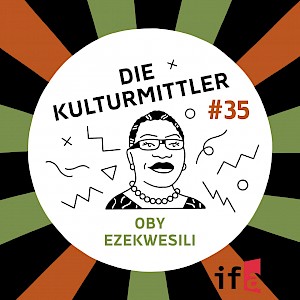
English Edition: Time to rethink politics. With Oby Ezekwesili
Democracies across the globe are in crisis. To rebuild trust and strengthen good governance, our guest Oby Ezekwesili advocates for the citizens to be put on centerstage of the political system. To fix politics, as she calls it, we must “elevate the office of the citizen to its rightful place in our nation and develop a political class of servant leaders.” But what does it take to empower citizens to understand their power and act on it? Where does international cultural policy come into play in this process? And how could a new multilateral system, based on these values and ideas, look like? Our guest Oby Ezekwesili is an economic policy expert, former vice-president of the World Bank for the African Region and has served twice as Federal Minister in Nigeria.

Vertreibung. Heimat. Europa. Mit Iris Wolff
Was bedeutet das zwangsweise Verlassen der eigenen Heimat für das Ankommen in einer neuen und welche Bedeutung hat es, in zwei Kulturen seine Wurzeln zu haben? Mit der in Rumänien geborenen Autorin Iris Wolff sprechen wir über Heimat und Identität. Welche Rolle haben die rund eine Million Angehörige der deutschen Minderheiten im östlichen Europa als „Brückenbauer“ in den Staaten Mittel- und Osteuropas sowie in den Nachfolgestaaten der Sowjetunion? Welchen Beitrag leisten sie als Vermittler:innen zwischen Sprachen, Kulturen und Staaten innerhalb und außerhalb Europas?
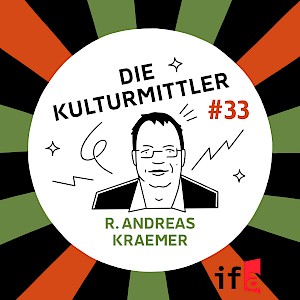
Klima, Krisen und Kultur. Mit R. Andreas Kraemer
Kultur und Klima. Zwei Themen, die von Politik und Gesellschaft bisher selten miteinander verknüpft wurden. Zeitgemäß ist das laut unserem heutigen Gast jedoch nicht mehr, denn alle Politikfelder müssen den Kampf gegen den Klimawandel mitdenken. Wie eine sinnvolle Klimaaußenpolitik aussehen und internationale Kulturarbeit nachhaltiger gestaltet werden kann und wie der globale Norden Klimamigration zukünftig politisch berücksichtigen muss, darüber sprechen wir mit R. Andreas Kraemer. Er ist Gründer des Ecologic Institute und Experte in Klima- und umweltpolitischen Fragen. Im November 2021 moderierte er außerdem die ifa-Veranstaltungsreihe „Total Glokal“, die sich regelmäßig mit den Wechselwirkungen zwischen Lokalem und Globalem beschäftigt – diesmal in Bezug auf den Klimawandel und Klimagerechtigkeit.
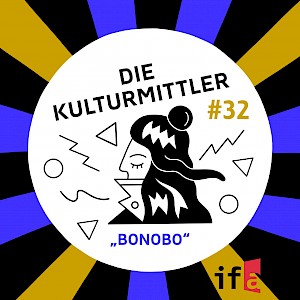
English Edition: Queer rights under pressure. With “Bonobo”
In the context of the Trans Awareness Week in November, we talked to Egyptian LGBTQIA+ activist „Bonobo“ about the situation in their home country. In addition to the global backlash of queer rights, repressive regulations prevent NGOs from doing their vital work. Though some successful projects exist, there is still a lot to be done. „Bonobo“ explains what actions are required in order to improve the situation, and stresses which duties the foreign cultural policy has in this fight for justice.
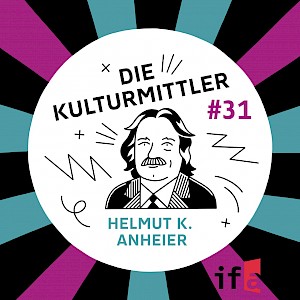
Von Fußball und Konfuzius. Soft Power in der Außenpolitik. Mit Helmut K. Anheier
Mit der Ausrichtung der Fußball-WM versucht das Golf-Emirat Katar sein politisches Image aufzubessern, während Boris Johnson bereits von der “soft power superpower” Großbritannien spricht. Es scheint offensichtlich: Um für die politischen Herausforderungen und Krisen des 21. Jahrhunderts gewappnet zu sein, ist Soft Power relevanter denn je. Aber was ist das eigentlich; „weiche Macht“? Und in welchem Verhältnis steht sie zur Auswärtigen Kultur- und Bildungspolitik Deutschlands?
Im Podcast haben wir Helmut K. Anheier von der Hertie School of Governance zu Gast. Er erklärt, wie Hard und Soft Power zusammen gedacht werden können, beleuchtet die Entwicklung von Soft-Power-Strategien verschiedener Länder und wann Soft Power mit Vorsicht zu genießen ist.
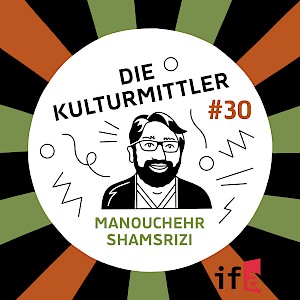
Game Changer – Videospiele in der Außenpolitik. Mit Manouchehr Shamsrizi
Games vermitteln politische Narrative und Botschaften interaktiver als jedes andere Medium; Spieler:innen entscheiden selbst über das Schicksal ganzer Nationen und Welten, teils mit engem Bezug zur Realität. Dennoch sind Videospiele selten Thema im öffentlichen Diskurs, ihr Status als Kulturmedium ist immer noch umstritten und in das Blickfeld der deutschen Außenkulturpolitik geraten sie erst seit Kurzem. Wir sprechen mit Manouchehr Shamsrizi, Gründer des Game Labs Berlin, über die große Bedeutung, die die Gamingwelt als Chance und Risiko zugleich für die Auswärtige Kultur- und Bildungspolitik birgt – und darüber, was Videospiele eigentlich mit Nation Branding und Soft Power zu tun haben.
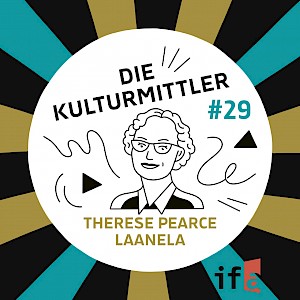
English Edition: Why Election Observation Matters. With Therese Pearce Laanela
Increasingly, elections that are fair, just and accessible to all cannot be taken for granted anymore. Hence, the role of election observers is becoming more and more important: Whenever an election is held, they are on site to report any irregularities or even fraud. In our podcast, we talk with Therese Pearce Laanela from International IDEA, an intergovernmental organisation supporting and promoting democratic processes worldwide, about how their mission has changed in recent years due to digitalisation and the pandemic, and what democratisation aid means in foreign policy.
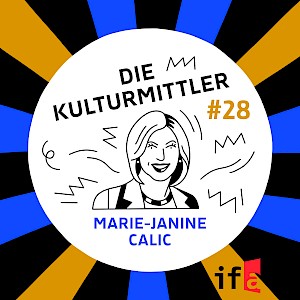
Versöhnung durch Erinnerung? Mit Marie-Janine Calic
Im Sommer 1991 begann Mitten in Europa ein Krieg mit weit über 100.000 Todesopfern und Millionen Vertriebenen und Geflüchteten. Erst jetzt, dreißig Jahre später, wurde die juristische Aufarbeitung der Jugoslawienkriege mit der endgültigen Verurteilung Ratko Mladićs, dem ehemaligen Oberbefehlshaber der serbischen Armee, offiziell beendet. Was und wie wird heute in den Nachfolgestaaten Jugoslawiens erinnert? Welche historische Verantwortung trägt die EU? Über nationale Identitäten, Geschichtspolitik und die Bedeutung der Zivilgesellschaft bei der Aufarbeitung der Geschichte sprechen wir mit der Historikerin Marie-Janine Calic.

Museen neu denken. Mit Clémentine Deliss
Die anstehende Eröffnung des Humboldtforums und die nun beschlossene Rückgabe der Benin-Bronzen setzen den Umgang mit dem kolonialen Erbe in europäischen Museen erneut auf die kulturpolitische Agenda. Wie kann ein neuer, dekolonialer Umgang mit ethnologischen Museumssammlungen aussehen? Dafür braucht es neue Konzepte und Ideen im Museumsbetrieb. Wir sprachen mit der Kuratorin Clémentine Deliss über die Zukunft von Museen und die Rolle der Mittlerorganisationen der Außenkulturpolitik dabei.
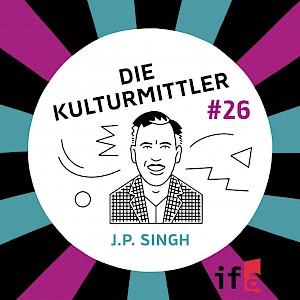
English Edition: Is America back? With J.P. Singh
It’s been 100 days since the start of Joe Biden’s Presidency. A lot has changed in the way the U.S. and Europe communicate. What common goals can be established between the U.S. and European countries – And what role does China play in their relationship? What impact does public opinion have on cultural relations? And do transatlantic politics really represent the way communities look today? We talked to J.P. Singh, an expert on international political economy, took a deeper look into Biden’s statement ‘America is back’ and discussed in which direction the transatlantic relations are heading.
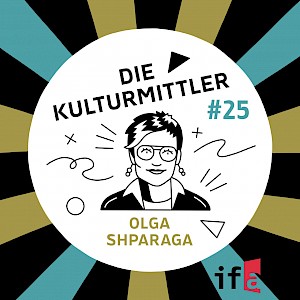
Europas letzte Diktatur. Mit Olga Shparaga
Über die Politisierung der belarussischen Gesellschaft, die besondere Rolle von Frauen bei der landesweiten Protestbewegung gegen Alexander Lukaschenko und die Relevanz digitaler Kommunikation für die Mobilisierung der Zivilgesellschaft sprechen wir im ifa-Podcast mit Olga Shparaga, Philosophin und Professorin am College of Liberal Arts in Belarus. Wir blicken außerdem über die Landesgrenzen hinaus und diskutieren die EU-Sanktionen und neue Formen der Zusammenarbeit zwischen Belarus und anderen europäischen Ländern.

Legendär und kontrovers: Der Deutsche Pavillon in Venedig. Mit Kolja Reichert
Was macht die Biennale in Venedig so einzigartig? Sind Länderpavillons noch zeitgemäß? Braucht die älteste und wichtigste Kunstausstellung ein Update? Kolja Reichert meint: Nein. Der Kunstkritiker und Journalist erläutert im ifa-Podcast „Die Kulturmittler“ vergangene Positionen und ihre politische Bedeutung und blickt auch in die Zukunft: Wird die, durch die Pandemie beschleunigte, Digitalisierung die Kunstwelt grundlegend verändern?

English Edition: Overestimated Brexit? With Stuart MacDonald
How does Brexit affect universities, the cultural sector and European cultural relations? We talked to public diplomacy expert Stuart MacDonald about European identity, nation branding and future challenges as well as opportunities for relations, networks and cooperations – in Europe and internationally.
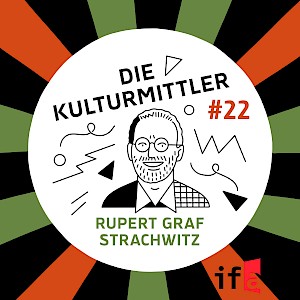
Die Macht der Vielen. Mit Rupert Graf Strachwitz
„Unbequem sein ist immer unbequem.“ Das gilt ganz besonders, wenn Zivilgesellschaften sich in die Politik einmischen, auch in Europa. Warum genau das aber so wichtig ist und was „Zivilgesellschaft“ eigentlich bedeutet, darüber sprechen wir mit Rupert Graf Strachwitz, Politikwissenschaftler und Direktor des Maecenata Instituts für Philanthropie und Zivilgesellschaft.

Luxusgut Menschenrechte? Mit Barbara Lochbihler
Vor 72 Jahren verabschiedeten die Vereinten Nationen die Allgemeine Erklärung der Menschenrechte. Wie ist es aktuell weltweit um sie bestellt? Und was kann Außenkulturpolitik angesichts zunehmender Einschränkung der zivilgesellschaftlichen Handlungsspielräume für ihre Stärkung tun? Darüber sprechen wir mit der Menschenrechtsexpertin Barbara Lochbihler.

Zwischen Innen und Außen. Mit Sigrid Weigel
Auswärtige Kultur- und Bildungspolitik beginnt im Inneren. Doch was tun, wenn Innen- und Außenpolitik im Widerspruch zueinander zu stehen scheinen? Wie kann die „dritte Säule der Außenpolitik“ gestärkt werden? Wir sprachen mit der Literatur- und Kulturwissenschaftlerin Sigrid Weigel über Handlungsvorschläge abseits von Ressortpolitik und nationalstaatlichen Perspektiven.
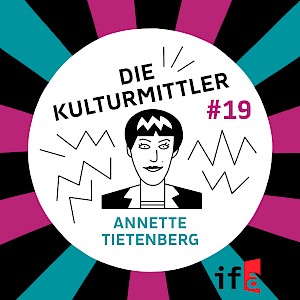
Die Kunst des Kuratierens. Mit Annette Tietenberg
Heute werden nicht mehr nur Ausstellungen kuratiert, sondern auch Playlists und Parkanlagen. Doch was heißt „kuratieren“ in der Kunst heutzutage? Welchen Einfluss hat die Digitalisierung auf kuratorisches Handeln? Und: Sind Kuratorinnen und Kuratoren nicht schon längst überflüssig? Über kuratorische Praxis und ihre außenkulturpolitische Verantwortung sprechen wir mit Annette Tietenberg, Professorin für Kunstwissenschaft an der HBK Braunschweig.
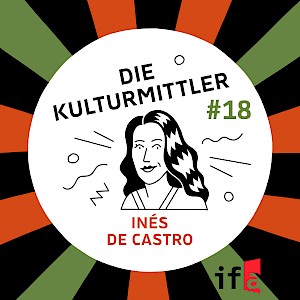
Das koloniale Erbe von Museen. Mit Inés de Castro
Als „Konserven des Kolonialismus“ haben ethnologische Museen eine ambivalente Vergangenheit. Doch welche Aufgaben haben völkerkundliche Museen heute eigentlich? Wie politisch sind sie? Und warum spielt die Architektur von Museumsgebäuden eine entscheidende Rolle? Wir sprachen mit Inés de Castro, Direktorin des Lindenmuseums in Stuttgart, über Rolle und Aufgaben, neue Formen der Präsentation und Zusammenarbeit, aktuelle Entwicklungen und das Museum von morgen.

Digitaler Aktivismus weltweit. Mit Geraldine de Bastion
Wie können Big Data und digitales Know-how zum Gemeinwohl beitragen? Was haben Innovation Hubs mit Zivilgesellschaften zu tun? Im aktuellen ifa-Podcast sprechen wir über das Potential von Digitalisierung für eine gerechtere Zukunft, über Open Source, die Vernetzung des globalen Nordens mit dem globalen Süden und Datensicherheit mit Geraldine de Bastion, Gründerin des internationalen Netzwerks Global Innovation Gathering.
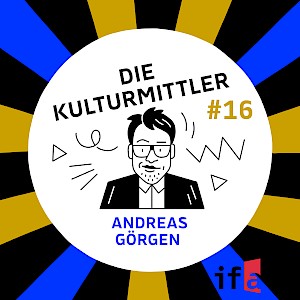
Neuausrichtung der internationalen Kulturpolitik. Mit Andreas Görgen
Die Pandemie hat die Überlegungen zur Neuausrichtung der Außenkulturpolitik verzögert und gleichzeitig beschleunigt, so Andreas Görgen, Leiter der Abteilung Kultur und Kommunikation im Auswärtigen Amt. Im aktuellen ifa-Podcast zeigt er, welche Chancen die deutsche EU-Ratspräsidentschaft bietet, wie wir mit unserem kolonialen Erbe umgehen sollten und wie das Museum der Zukunft aussehen kann.
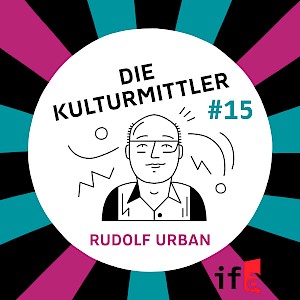
Fokus Deutsche Minderheiten. Mit Rudolf Urban
Deutsch-polnische Ortsschilder und Deutsch als Minderheitensprache in der Schule sind in der Woiwodschaft Oppeln/Opole in Polen keine Seltenheit: Etwa 100.000 Angehörige der deutschen Minderheit leben in der Region. Wie engagieren und organisieren sie sich? Und welche Rechte haben sie und andere Minderheiten im östlichen Europa? Wir sprachen mit Rudolf Urban, dem Chefredakteur von Wochenblatt.pl, der größten Zeitung der deutschen Minderheit in Polen.
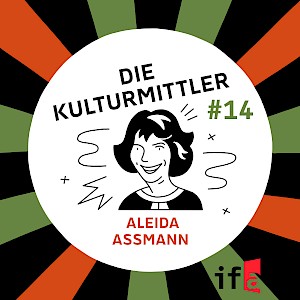
Neustart Europa. Mit Aleida Assmann
Seit Jahren hat Europaskepsis Konjunktur. Braucht Europa einen Neustart und wenn ja, was müsste sich ändern? Wir sprachen mit der Kulturwissenschaftlerin Aleida Assmann über ein gemeinsames kulturelles Gedächtnis Europas, über europäische Solidarität und wie wir sie in der aktuellen Coronavirus-Krise wiederherstellen können.

Globaler Widerstand. Mit Insa Wilke
Seit sich das Coronavirus ausbreitet, steht die Welt still. Dabei war sie bis vor Kurzem noch massiv in Aufruhr: Im Libanon, in Chile und Hongkong gingen vor dem Ausbruch der Pandemie Hunderttausende für mehr Gleichberechtigung oder gegen brutale Regimes auf die Straße. Was haben die Protestbewegungen gemeinsam? Und wo findet Widerstand in Zeiten von Social Distancing statt? Wir sprachen mit der Literaturkritikerin Insa Wilke, die für die aktuelle Ausgabe der Zeitschrift KULTURAUSTAUSCH in Chile war.

Freikirchen und politische Mobilisierung in den Amerikas. Mit Heinrich Wilhelm Schäfer
In Lateinamerika und den USA spielen Freikirchen eine bedeutende Rolle. Ihr Einfluss auf die Politik wächst. Nicht wenige finden sich in den USA in der Anhängerschaft Trumps und in Brasilien bei Bolsonaro wieder. Wie funktionieren diese freikirchlichen Organisationen? Welche Werte vertreten sie? Und mit welchen Strömungen sind in der internationalen Kulturarbeit Kooperationen möglich? Wir sprachen mit Heinrich Wilhelm Schäfer, Professor für Evangelische Theologie und Religionssoziologie und Autor der Studie „Friedenspotenzial von Freikirchen in den USA und Lateinamerika“ im ifa-Forschungsprogramm „Kultur und Außenpolitik“. Hier geht’s zur Studie: https://publikationen.ifa.de/Kultur-und-Aussenpolitik/Friedenspotenzial-von-Freikirchen-in-den-USA-und-Lateinamerika.html
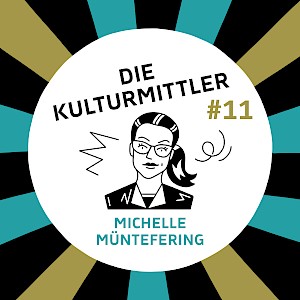
Wie steht es um die internationale Kulturpolitik? Mit Michelle Müntefering
Globalisierung, Digitalisierung und Klimawandel verändern die deutsche Außenkulturpolitik. Was sind aktuelle Aufgaben? Wie sieht die strategische Neuausrichtung aus? Und welche Rolle spielt die Aufarbeitung des deutschen Kolonialismus? Michelle Müntefering, Staatsministerin für internationale Kulturpolitik im Auswärtigen Amt, hat mit uns über die Stärkung von Freiräumen, europäische Kulturpolitik und ihre persönliche Motivation hinter diesen Aufgaben gesprochen.

Kunst auf Welttournee. Mit Hito Steyerl und Nina Bingel
Jährlich tournieren rund 20 ifa-Ausstellungen mit Werken von über 200 Künstlerinnen und Künstlern. Das ifa arbeitet dabei weltweit mit Museen ebenso wie mit unabhängigen Kunsträumen zusammen, um diese als Lernorte und Diskussionsplattformen zu gestalten und vor allem: um Freiräume für aktuelle Diskurse zu schaffen. Die Künstlerin Hito Steyerl und Nina Bingel, Leiterin der Tourneeausstellungen am ifa, beleuchten das Konzept aus unterschiedlichen Perspektiven.
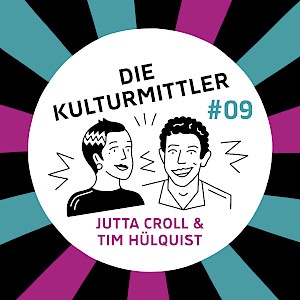
Mobilisierung im Netz. Mit Jutta Croll und Tim Hülquist
Der arabische Frühling, #metoo und Fridays for future zeigen, wie schnell viele Menschen im Netz mobilisiert werden können. Wie unterstützen zivilgesellschaftlich Akteure die Möglichkeiten der digitalen Beteiligung? Wie können sich Zivilgesellschaften digital mobilisieren und beteiligen? Welche Rolle spielt das Internet bei politischen Entscheidungsprozessen? Jutta Croll, Vorstandvorsitzende der Stiftung Digitale Chancen und Tim Hülquist, Projektleiter des Cross Culture Programms am ifa geben Einblicke in ihre Arbeit.

Bibliotheken und die Digitalisierung – Wissen zu internationalen Kulturbeziehungen. Mit Sabria David und Gudrun Czekalla
Bibliotheken stellen Informationen bereit und machen Wissen zugänglich. In Zeiten von Suchmaschinen und Online-Enzyklopädien stehen sie jedoch vor neuen Bedingungen. Die ifa-Bibliothek in Stuttgart ist weltweit die größte Spezialbibliothek zu internationalen Kulturbeziehungen. Wie kann dieses Wissen durch die Digitalisierung weltweit zugänglich gemacht werden? Und welche Rolle spielt eine Organisation wie Wikimedia dabei? Wir haben nachgefragt bei Sabria David, stellvertretende Präsidiumsvorsitzende von Wikimedia Deutschland, und Gudrun Czekalla, Leiterin der ifa-Bibliothek.
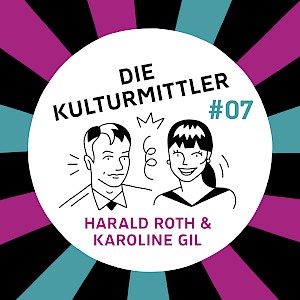
Brückenbauer im östlichen Europa. Mit Harald Roth und Karoline Gil
In Mittel- und Osteuropa leben noch circa 1,4 Millionen Angehörige der deutschen Minderheiten. Wer zählt dazu? Welche Rolle spielen Minderheiten in den jeweiligen Mehrheitsbevölkerungen in beispielsweise Polen, Rumänien oder Ungarn? Und wie können sie zu einem friedlichen Miteinander in Europa beitragen? Wir sprechen mit Harald Roth vom Deutschen Kulturforum östliches Europa und Karoline Gil, Leiterin des Bereichs „Integration und Medien“ am ifa.

Forschung in der AKBP – Was Cybersicherheit mit Kultur zu tun hat. Mit Odila Triebel und Andreas Heinemann-Grüder
Das Internet ist Ort grenzenloser Freiheit, Vernetzung und ungehinderten Austauschs. Doch der digitale Wandel bringt auch Schattenseiten: Troll-Armeen, Hackerangriffe und Wahlmanipulationen gefährden zunehmend die Sicherheit. Wie kann Außenkulturpolitik unter diesen Bedingungen zu einer freien, friedlichen und sicheren Welt beitragen? Odila Triebel vom ifa-Forschungsprogramm „Kultur und Außenpolitik“ und Andreas Heinemann-Grüder vom Bonn International Conversion Centre (BICC) über digitale Normen, Werte und die kulturellen Grundlagen der Freiheit im digitalen Zeitalter.

Schutzprogramme für bedrohte Kulturschaffende. Mit Esra Küçük und Maik Müller
In vielen Teilen der Welt werden Künstler/-innen und Kulturschaffende wegen ihrer Arbeit bedroht, verhaftet, sogar gefoltert. Die Martin-Roth-Initiative, ein Schutzprogramm, reagiert darauf und ermöglicht temporäre Schutzaufenthalte in Deutschland oder Drittländern. Was bedeutet es für die Kunstschaffenden und ihre Kunst, wenn sie im Exil arbeiten müssen? Welche Verantwortung trägt Deutschland dabei? Esra Küçük, Geschäftsführerin der Allianz Kulturstiftung und Maik Müller, Leiter der Martin-Roth-Initiative, geben Antworten.
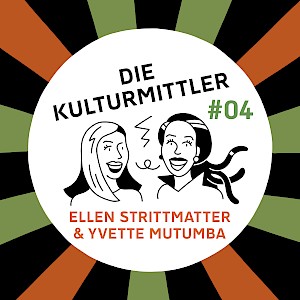
Von Venedig bis in die Antarktis – Biennalen im Fokus. Mit Yvette Mutumba und Ellen Strittmatter
Zum 58. Mal eröffnet in Kürze eine der wichtigsten internationalen Kunstausstellungen weltweit: die Biennale di Venezia. Auch in Dakar, in Berlin und sogar in der Antarktis werden Biennalen, Triennalen oder Quadriennalen veranstaltet – weit über 200 gibt es derzeit weltweit. Warum erfreut sich dieses Ausstellungsformat so großer Beliebtheit? Und was macht das mit der Kunst? In Folge vier des ifa-Podcasts „Die Kulturmittler“ sprechen Ellen Strittmatter, Leiterin der Kunstabteilung des ifa und Yvette Mutumba, Chefredakteurin des Kunstmagazins CONTEMPORARY AND über Venedig, Biennalen und die zeitgenössische Kunst.

Vision Europa: Gemeinsame Werte oder gleiches Recht für alle? Mit Ulrike Guérot und Sebastian Körber
Kulturelle Vielfalt, Wissensaustausch, Reisefreiheit – Europa hat viel für die Bevölkerung zu bieten. Dennoch kriselt es an vielen Ecken: Misstrauen und Unsicherheit spalten die EU-Bürgerinnen und Bürger. Kann Kultur es richten? Oder sorgt eher die Durchsetzung gleicher rechtlicher Standards für mehr Zusammenhalt - Stichwort „Europäische Republik“? Darüber sprechen der stellvertretende Generalsekretär des ifa Sebastian Körber und die Politikwissenschaftlerin Ulrike Guérot in Folge drei des ifa-Podcasts „Die Kulturmittler“.
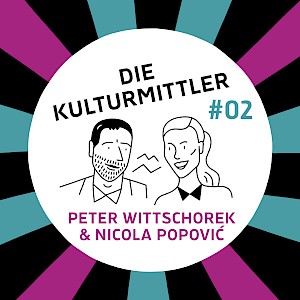
Wege der weltweiten Friedensförderung. Mit Nicola Popović und Peter Wittschorek
Zu Frieden gehört mehr als Abkommen und Verträge. Wie setzen sich zivilgesellschaftliche Organisationen auf internationaler, vor allem aber auf lokaler Ebene für ein friedliches Miteinander ein? Und wie kann die Politik, ob im UN-Sicherheitsrat oder durch Förderprogramme, die Arbeit vor Ort unterstützen? Darüber sprechen Nicola Popović, Beraterin für Frauen, Frieden und Sicherheit, und Peter Wittschorek, Leiter des ifa-Förderprogramms „zivik“, in Folge 2 des ifa-Podcasts „Die Kulturmittler“.
Link zum ifa-Input von Nicola Popovic: 1325 Snapshots from the Field: https://www.ifa.de/wp-content/uploads/2019/01/ifa_input_Projects-on-Women-Peace-and-Security-1-6.pdf
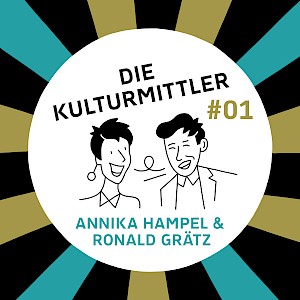
Wer oder was ist die AKBP? Mit Annika Hampel und Ronald Grätz
In der ersten Folge „Die Kulturmittler“ sprechen Kulturwissenschaftlerin Annika Hampel und ifa-Generalsekretär Ronald Grätz über das große Thema unseres Podcasts: Auswärtige Kultur- und Bildungspolitik oder auch einfach AKBP. Wer betreibt Kulturaußenpolitik wie, wo und warum? Wie hat sie sich in Deutschland im Laufe der Zeit gewandelt und wo stößt sie an ihr Grenzen?
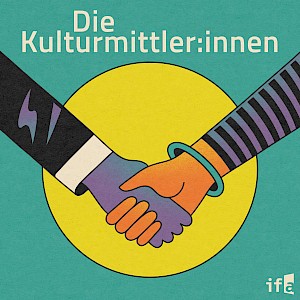
Die Kulturmittler | Intro
Ein kleiner Vorgeschmack auf den Podcast des ifa (Institut für Auslandsbeziehungen). Bevor wir uns ab Ende Januar in „Die Kulturmittler“ einmal im Monat mit aktuellen Themen und Debatten der Auswärtigen Kultur- und Bildungspolitik beschäftigen, geben wir einen Einblick in die Arbeit des ifa und einen kleinen Ausblick auf das was Euch in diesem Podcast erwartet.
